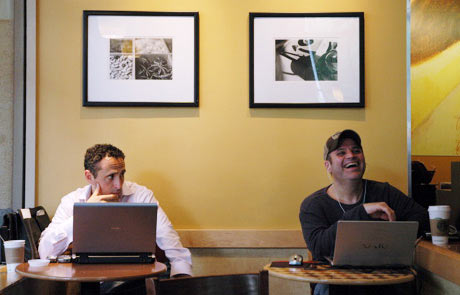当前位置: Language Tips> 双语新闻
|
 Whether it is photos, personal status or unwanted comments, most Americans think people 'overshare' personal information online and a third admit not everything they post is true. |
|
Whether it is photos, personal status or unwanted comments, most Americans think people 'overshare' personal information online and a third admit not everything they post is true. A survey for Intel Corporation on mobile etiquette and digital sharing showed that 90 percent of Americans think too much is being divulged, and nearly half feel overwhelmed by all the data that is out there. One in five of the 2,008 people questioned by Ipsos Observer for Intel admitted that some of what they post is false. "People are still sorting through what does it means to share, who is the audience you are sharing with, what do those audiences want and how do they feel about things?" said Dr Genevieve Bell, the director of user interaction and experience at Intel Labs. "Those are the things that are really fluid. We are still sorting it out both at a personal level and a cultural level." For many, sharing online with smartphones, laptops, notebooks and tablets is easier than in person. A third of people admitted they were more comfortable with digital sharing than face to face, and a quarter said they had a different personality online. About 85 percent of Americans post information online and a quarter do it every day, according to the survey. For 65 percent of US adults, sharing makes them feel closer to family and friends and nearly half said if they didn't communicate online they wouldn't know what is going on with those near and dear to them. But the wealth of digital information can also be annoying. Most US adults said they are vexed by people who complain constantly and similar numbers found posting inappropriate or explicit photos and private information bothersome. Bell said the results of the poll show people are still having difficulty dealing with technology. "The fact that people are still grappling with how to balance the benefits of mobile technology with the downsides - this means we all still have those moments of poor mobile manners," she explained. (Read by Nelly Min. Nelly Min is a journalist at the China Daily Website.) (Agencies) |
不管是照片、个人状态还是多余的评论,大多数美国人认为人们在网上“过度分享”了个人信息,三分之一的人承认自己上传到网上的东西并不全是真的。 为英特尔公司开展的一项关于手机礼节和数字化资源分享的调查显示,90%的美国人认为人们透露了太多个人信息,近半数美国人表示网上的信息泛滥让人受不了。 益普索观察机构为英特尔公司开展的这一调查访问了2008个人,其中有五分之一承认自己上传的某些内容不实。 英特尔实验室的用户互动和体验部主管吉纳维芙•贝尔博士说:“人们仍然在摸索分享的意义:你要与之分享的观众是谁,这些观众需要什么,他们对所分享物的感觉如何?” “这些都是很容易变化的。不论是个人层面还是文化层面,我们都依然在摸索当中。” 对许多人而言,用智能手机、笔记本电脑、上网本和平板电脑在网上分享资源比当面与人分享要容易。三分之一美国人承认他们在网上分享数字化资源比当面与人分享更自在,四分之一的人说他们在网上完全是另一种性格。 据调查,约85%的美国人在网上上传信息,四分之一的美国人天天上传。对65%的美国成人而言,分享信息让他们感觉和家人朋友更亲近,近半数的人说如果他们不在网上交流,他们就不能知道亲近的人的近况。 但是,数字化信息的丰富也可以让人生厌。 大多数美国成人称,他们对那些在网上不断抱怨的人很恼火,数量相近的美国人觉得上传不适宜或太暴露的照片和私人信息很烦人。 贝尔说,调查结果显示,人们在应对技术方面仍有困难。 她解释说:“人们依然在尽力平衡手机技术的利弊,这意味着我们的手机礼节不周还要持续一段时间。” 相关阅读 (中国日报网英语点津 陈丹妮 编辑:Julie) |
|
Vocabulary: divulge: 泄露;暴露 fluid: 不固定的;易变的 vex: 使生气;使痛苦;使烦恼 |
上一篇 : 奥运短租价涨20倍 伦敦房东赶房客
下一篇 : 《时代》封面登三岁男童吃母乳照
电话:8610-84883645
传真:8610-84883500
Email: languagetips@chinadaily.com.cn